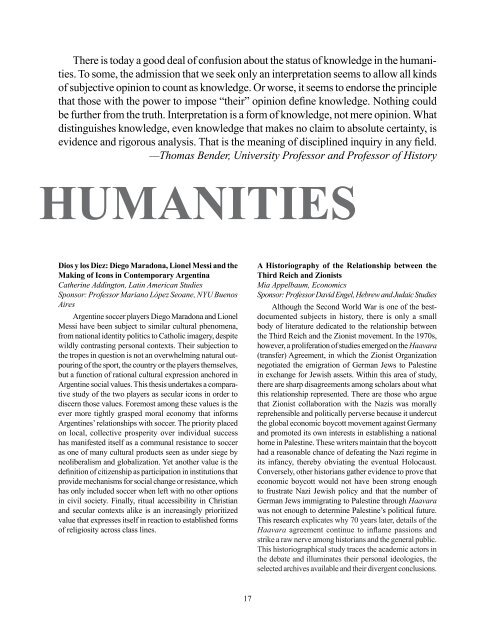INQUIRY
InquiryXIX
InquiryXIX
Create successful ePaper yourself
Turn your PDF publications into a flip-book with our unique Google optimized e-Paper software.
<strong>INQUIRY</strong> • Volume 18, 2014<br />
There is today a good deal of confusion about the status of knowledge in the humanities.<br />
To some, the admission that we seek only an interpretation seems to allow all kinds<br />
of subjective opinion to count as knowledge. Or worse, it seems to endorse the principle<br />
that those with the power to impose “their” opinion define knowledge. Nothing could<br />
be further from the truth. Interpretation is a form of knowledge, not mere opinion. What<br />
distinguishes knowledge, even knowledge that makes no claim to absolute certainty, is<br />
evidence and rigorous analysis. That is the meaning of disciplined inquiry in any field.<br />
—Thomas Bender, University Professor and Professor of History<br />
HUMANITIES<br />
Dios y los Diez: Diego Maradona, Lionel Messi and the<br />
Making of Icons in Contemporary Argentina<br />
Catherine Addington, Latin American Studies<br />
Sponsor: Professor Mariano López Seoane, NYU Buenos<br />
Aires<br />
Argentine soccer players Diego Maradona and Lionel<br />
Messi have been subject to similar cultural phenomena,<br />
from national identity politics to Catholic imagery, despite<br />
wildly contrasting personal contexts. Their subjection to<br />
the tropes in question is not an overwhelming natural outpouring<br />
of the sport, the country or the players themselves,<br />
but a function of rational cultural expression anchored in<br />
Argentine social values. This thesis undertakes a comparative<br />
study of the two players as secular icons in order to<br />
discern those values. Foremost among these values is the<br />
ever more tightly grasped moral economy that informs<br />
Argentines’ relationships with soccer. The priority placed<br />
on local, collective prosperity over individual success<br />
has manifested itself as a communal resistance to soccer<br />
as one of many cultural products seen as under siege by<br />
neoliberalism and globalization. Yet another value is the<br />
definition of citizenship as participation in institutions that<br />
provide mechanisms for social change or resistance, which<br />
has only included soccer when left with no other options<br />
in civil society. Finally, ritual accessibility in Christian<br />
and secular contexts alike is an increasingly prioritized<br />
value that expresses itself in reaction to established forms<br />
of religiosity across class lines.<br />
A Historiography of the Relationship between the<br />
Third Reich and Zionists<br />
Mia Appelbaum, Economics<br />
Sponsor: Professor David Engel, Hebrew and Judaic Studies<br />
Although the Second World War is one of the bestdocumented<br />
subjects in history, there is only a small<br />
body of literature dedicated to the relationship between<br />
the Third Reich and the Zionist movement. In the 1970s,<br />
however, a proliferation of studies emerged on the Haavara<br />
(transfer) Agreement, in which the Zionist Organization<br />
negotiated the emigration of German Jews to Palestine<br />
in exchange for Jewish assets. Within this area of study,<br />
there are sharp disagreements among scholars about what<br />
this relationship represented. There are those who argue<br />
that Zionist collaboration with the Nazis was morally<br />
reprehensible and politically perverse because it undercut<br />
the global economic boycott movement against Germany<br />
and promoted its own interests in establishing a national<br />
home in Palestine. These writers maintain that the boycott<br />
had a reasonable chance of defeating the Nazi regime in<br />
its infancy, thereby obviating the eventual Holocaust.<br />
Conversely, other historians gather evidence to prove that<br />
economic boycott would not have been strong enough<br />
to frustrate Nazi Jewish policy and that the number of<br />
German Jews immigrating to Palestine through Haavara<br />
was not enough to determine Palestine’s political future.<br />
This research explicates why 70 years later, details of the<br />
Haavara agreement continue to inflame passions and<br />
strike a raw nerve among historians and the general public.<br />
This historiographical study traces the academic actors in<br />
the debate and illuminates their personal ideologies, the<br />
selected archives available and their divergent conclusions.<br />
17


